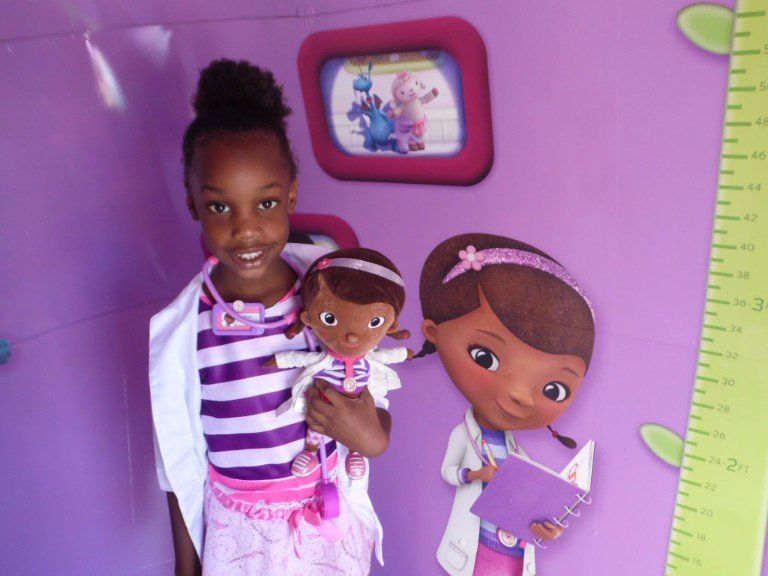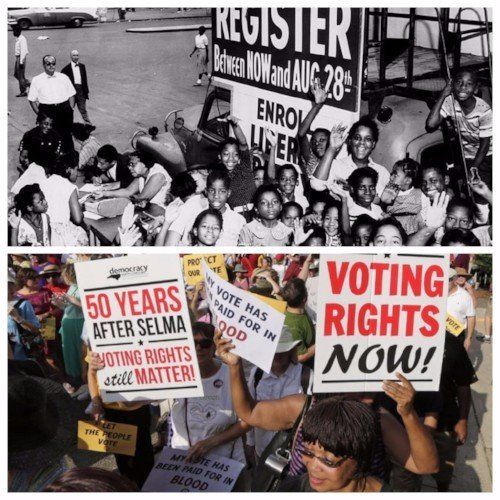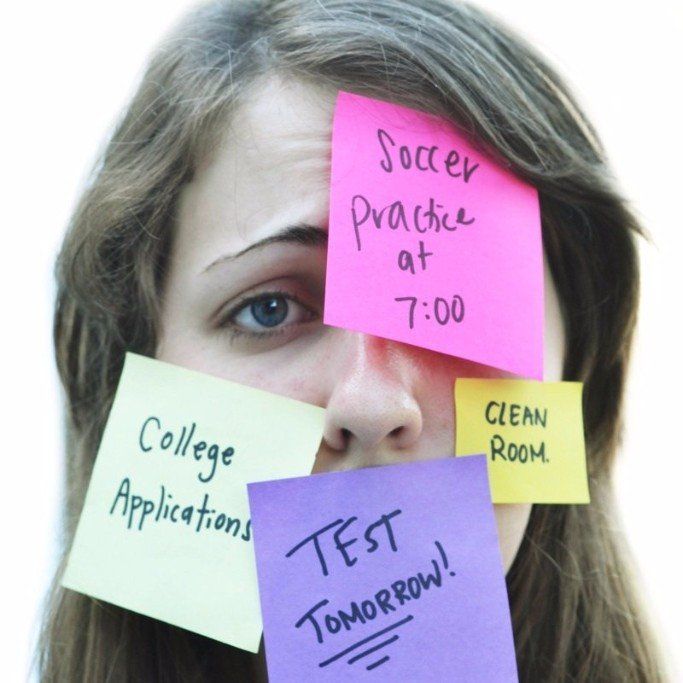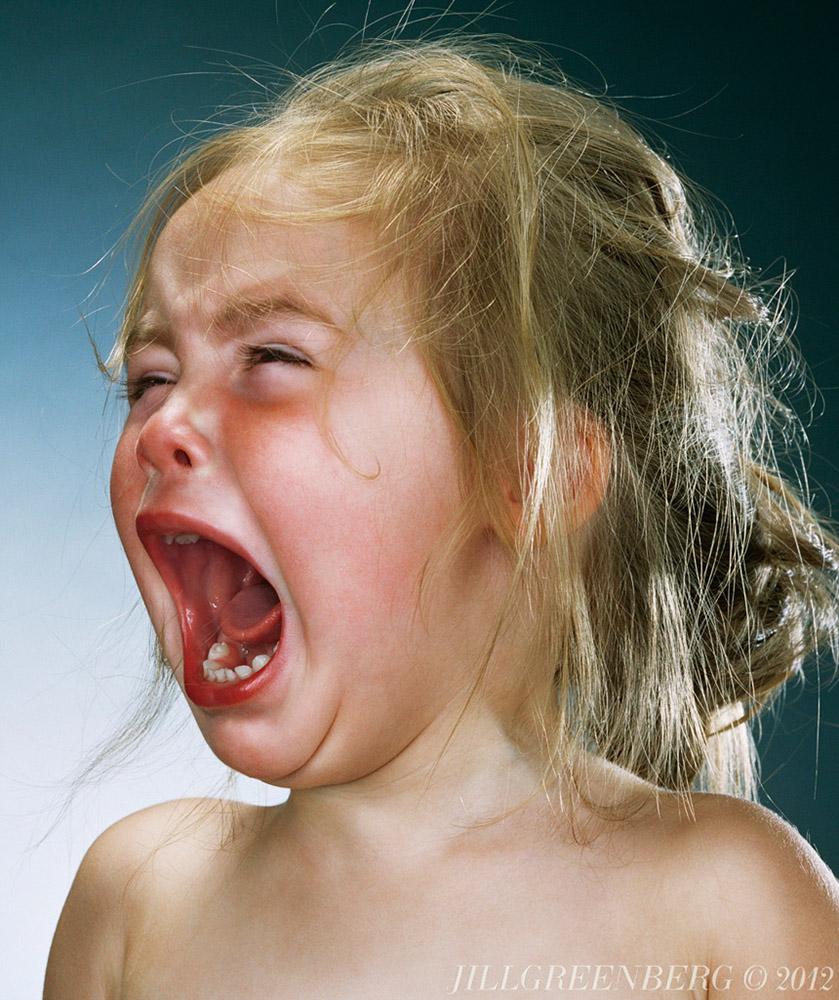
I remember when I heard the news of a kids television show on Disney Junior starring a six year old black girl. Feelings of excitement, wonder, and curiosity coursed through me. The last time I saw a black girl as the protagonist on a kids show was in Proud Family and that was about 7 years ago. The icing on the cake is the fact that she is a doctor for her stuffed animals and toys who can actually communicate with them through her magical stethoscope that was given to her by a grandmother, a former stuffed animal doctor herself (black girl magic anyone?). The show is Doc McStuffins.
The first episode aired March 23, 2012. While I felt like I was a little too old for the show (still hasn’t kept me from watching), by the end of the year I had a little sister on the way who needed this show. In 2015, when my sister turned two, Doc Mcstuffins was on non stop. The opening lyric “The Doc is here and she’ll fix you up” would fill the house at least once a week. Halloween was on its way and my little sister dressed up as the young doctor in training, singing “Time for your checkup, Time for your checkup.”
While it may seem typical of any little girl between the ages of 2 and 7 to dress up as her TV idol, it’s still spectacular to see my sister, a young black girl, find a mirror image of herself on television. She can dress up as someone that she can relate to. That’s not something that most black women today can say as a result of the scarce and inaccurate portrayals of black females in media and literature. I know that I was confused by the lack of characters in media and literature that looked like me. I began to think that people who looked like me were interesting enough to be portrayed in television shows or movies; our stories weren’t valuable and didn’t need to be told.
I found solace in a character named Winter in the Lunar Chronicles, a series of books that each have a twist on the original princess stories. Winter, the princess representing Snow White, actually has deep, mocha-colored skin, a contrast to the “white as snow” skin of the original Snow White. Winter is the most beautiful princess on Luna, a nation on the moon, whose beauty is envied by her evil stepmother, Queen Levana. Winter sacrifices her sanity to keep from abusing people with her Lunar mind control power that almost everyone on Luna possess. This character’s story stuck with me because one, it deals with mental illness which is a taboo topic in the Black American community, and two, black women are not usually portrayed as “the most beautiful woman in the land.”
An internet series that I connected with was The Misadventures of Awkward Black Girl. The title is pretty self explanatory; the show follows the life of a Black Girl who is… awkward. She has uncomfortable conversations daily and raps about her anger in the comfort of her home to avoid conflict. When I first saw this show, I was in love. Nobody ever talks about the awkward black girls out there who aren’t cool and sadly don’t know how to dance. Nobody talks about the gothic black girls that listen to Screamo and wear eyeliner almost everyday. We never see the alternative black girls who don’t follow mainstream style. But they exist. I’m a perfect example; I have uncomfortable conversations almost everyday, I avoid looking people in the eye so I don’t have to say hi to them in the extremely long hallway for the fifteenth time, and I can’t ‘hit dem folks’ or ‘milly rock’ (even though I still try).
It is also important that these narratives are told by the people themselves. I will not have the same perspective as a person of Hispanic descent from Puerto Rico; therefore, I do not have the credentials or ability to tell her narrative with the same conviction and vice versa. We need to have control over how we are portrayed so that we can craft our own self image.
For example, the infamous Mamie narrative (a stereotypical portrayal of the big and benevolent slave) was created by slave owners to create a pretty picture of slavery. This character was not created by the black female slaves themselves and therefore was not accurate. While this is an extreme example, it still applies. However, this is not to say that authors, directors, and other storytellers must stick to their race or culture when telling stories. It just means that it is vital to take input from the people who are being portrayed.
As our society continues to progress, we begin to find value in narratives of all kinds that includes people from all different backgrounds. More people are beginning to realize that their stories are valuable and deserve to be told. Their stories are rich, multi-dimensional, and full of magic.

“Black people should have voted.”
I cringe at that accusatory statement that perpetually forces the narrative that black and brown people don’t care enough about their own government or are too lazy to vote. This phrase reverberated among my liberal leaning friends who rooted for democratic presidential candidate Hillary Clinton after the “45th” won the candidacy.
“If people sucked it up and voted under Democrat or Republican and [not independent], we would not be in this situation.”
After the election, people were bewildered and angry. Instead of coming together to discuss what the new administration could mean for all of America and strategizing to take action, people who are liberal leaning started to play the blame game. The time we should have spent organizing was mercilessly wasted on pointing fingers and erroneously assigning fault.
Those opinions arrested my mind for days and I didn't know how to respond. I've realized that those accusers are not conscious of the various mechanisms used to abrogate the black and brown vote and in turn smother their voices. We are merely puppets, our moves predetermined by the mastermind puppeteers focused on keeping their status and position by using various voter suppression practices.
A very effective way of keeping poor people, immigrants, people of color, and even the elderly and those who intersect all of those groups out of the election process is voter registration. The exhaustive factors it takes to register are not only time consuming but very expensive. There are various documents required for identification and trying to acquire these documents is not practical. An individual has to acquire a copy of their birth certificate, marriage license, and any other document that confirms their citizenship from states that might exact a fee.
A specific example is the strict voter ID law in Wisconsin which “the federal court held that the law unconstitutionally burdens low-income people of color, but ultimately the Supreme Court allowed it to go into effect for the 2016 election.” The fact that the law proposed and signed in 2011 by Governor Scott Walker but was finally enacted for the 2016 election should speak volumes. On some levels, it may be understandable to make sure that the person voting is who they say they are, but when is it too much?
Alongside voter registration is Election day, a suppressive tactic hidden in plain sight. It just happens to take place on a workday. “What’s the big deal, simply take one day off.” There are people of the working class who do not have the luxury of “simply” taking a day off because that means sacrificing one day of pay which most can’t afford to do. The opportunity cost of standing in line for hours instead of earning pay to support their family is not something most are willing to risk. And while early voting was put in place, some states tried to get rid of this necessary adjustment. By scheduling Election Day on a work day, the poor and working class are effectively disenfranchised.
Not to mention the countless felons that are hindered from voting. On top of felons finding it impossible to attain a job, they are also the “5.8 million Americans barred from participating in elections.” It’s no coincidence that black Americans are disproportionately affected by this obstacle since they are specifically targeted under harsh and misguided drug sentences. This can be traced back to the War on Drugs started by President Reagan and sustained by President Clinton. Under the Clinton administration, about 80 to 90 percent [in seven states] of all drug offenders sent to prison were black Americans, even though they weren't selling or using more drugs than white Americans.
It’s imperative to note that this happened under the Clinton administration and as the First Lady, Hillary was supportive of this policy. Even though the Clintons later realized how destructive their policies were, their apology was too late because this harmful system already committed a mass amount of damage to black Americans across the country. This “New Jim Crow” continues to legally classify many black Americans as second class citizens and subliminally reaffirm racial bias. Along with voting rights, the right to serve on a jury, right to be free of legal discrimination and employment, and access to public benefits are all taken away. Keeping in mind the support she gave for the War on Drugs, black Americans still showed up to vote for her. So is it fair to say that the black vote is to blame especially since 95% of black women voted for Hillary and were responsible for closing the gender gap between her and Trump?
Then there is bipartisanship, a constructive measure that wards off the “radical” independents. It may seem harmless but it in actuality, it is detrimental to those who are dissatisfied with the fork in the road. Most people know that if you haven't decided between the two parties, you won't even make it to the booth. Individuals who believe that neither party will fight for their ordained rights should have the license to vote in any primary they please.
Through the mechanisms stated above and more such as gerrymandering, the voter turnout can sometimes be low and as a result, not representative of all Americans. And unfortunately, we end up with election results resembling that of 2016. Therefore, I believe it would be more effective and efficient to help the victims listed above overcome voter suppression instead of blaming them for being suppressed.

For my first blog post, I wanted my first statement to be groundbreaking and bold. I planned to write about something pertinent and controversial such as police brutality of black bodies or trans rights. Instead, I’m going to talk about a battle that I believe most teenagers deal with.
Each year of my high school career starts off with bouts of depression and anxiety that fluctuate throughout the year and finally dwindle with the return of the much-needed summer break. My anxious, at times paralyzing, thoughts tend to ambush and suffocate my mind rendering me apathetic for days, weeks, or months at a time. It’s an annual habit that started freshman year that I can’t seem to shake. And it increases in severity with each passing year. This summer, the mental chaos struck in the third week of July, practically a whole month before the start of my senior year of school.
I could feel the insidious thoughts trickling into my mind after I had a dream about an AP Biology test. The nightmare opened with me stumbling through the sinister halls of my high school while kids gawked and laughed at me. Was it something I was wearing or something I said? At a sudden moment of realization that we all have in dreams, I was aware my classmates were ridiculing me because they all knew I failed the AP Biology test. As I awoke, the floodgates opened and all the insecurities that played out in my dream were now taunting my conscious thoughts. The rest of the day, I trudged throughout the house letting my feelings conquer me and the happiness I have struggled so hard to achieve. A dark cloud with a slight drizzle followed me wherever I went.
I couldn’t stay focused on the present, my mind always wandering toward the ominous and doomed future: my third attempt at the SAT, college applications, finishing my final essay for Anthropology dual enrollment class, AP Biology summer homework, creating my natural hair club at school, and drafting this blog entry. Again, I felt like my mind was suffocating from pressure and self-doubt. I anticipated the moment when I would choke on each serving of the six-course meal that I prepared myself. I was expecting to fail; it was just a matter of when and how.
And I am not the only teenager afflicted with this constant, draining stress. A slight variation of the narrative above is familiar to most teenagers. According to the National Institute of Mental health, about 25.1% of 13 to 18-year-olds struggle with anxiety. High schoolers are expected to take as many AP, IB, or dual enrollment courses as they can to raise their GPA and, most importantly, their HPA to look attractive to colleges. On multiple occasions I witness my peers breaking down at school over a subpar grade or when the pressure became too much. One test, a measly piece of paper, can cause a teenager to question their intelligence, their drive, and even their worth. A grade magnifies self-doubt and diminishes an already fragile and low self-esteem. Relationships with friends and family become strained and their physical well-being suffers.
While most people know anxiety to be emotionally taxing, it may result in a multitude of health issues. Irregular or severe menstruation, constant fatigue, migraines, digestion issues, and change in appetite or weight are just a few issues that can arise. I listed those above because I have personally experienced them but there are plenty more physical symptoms since stress impacts each person differently.
So what should we do? How do we eliminate anxiety? There is no real answer and no definite solution that will magically take away all the pain and discomfort that comes with adolescence. Eating right, drinking water, and exercising, all relatively easy ways of taking care of yourself, are methods to diminish stress and anxiety. Talking to a family member, friend, or a therapist is beneficial to emotional well-being. But sometimes it is even hard to come up with the right words to describe this severe dread. I am fortunate to have the strong support system that I have. My parents put a significant amount of emphasis on my emotional state rather than my performance because I emphasize performance myself. Many teenagers don’t have a strong foundation in their family and that’s when it may be time to journal. Internalizing all the negative energy is not the answer. And some days, it will be hard to shake the worry off and none of the things I listed above will alleviate the gloom. Anxiety will not go away overnight; it usually requires continuous effort and reflection.
Personally, my anxiety may never go away and managing it is a continuous journey with various highs and lows. The most valuable lesson I am learning on this journey to self-love is that I control what I think and how I feel about myself. I am my worst critic and while that may give me more drive to do better, it can exacerbate the anxiety that is already festering in my soul. It’s all about balance: challenging myself to do better and strive for more, but also knowing when it’s time to relax and give myself credit.
Thousands of students across the world can relate to the statements above. The one thing that I want students who are struggling emotionally to gather from this entry is not to give up on yourself. You are worthy and your happiness is valuable.
